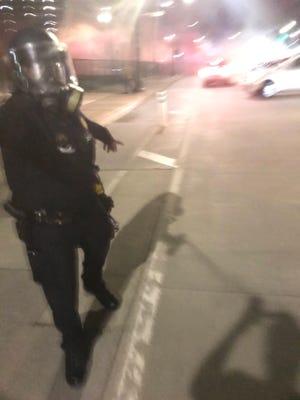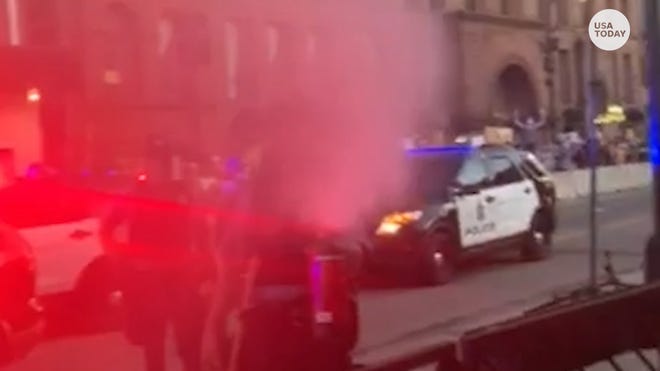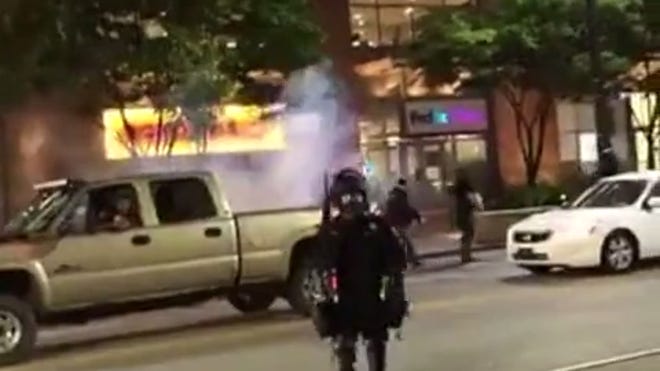Journalists blinded, injured, arrested covering George Floyd protests nationwide
Lorenzo Reyes
USA TODAY
VIDEO AT THE END
As protests across the U.S. raged over police brutality and the killing of George Floyd, police forces aimed to disperse demonstrators.
In some incidents, members of the news media appeared to be targeted, by police and protesters alike.
“Targeted attacks on journalists, media crews and news organizations covering the demonstrations show a complete disregard for their critical role in documenting issues of public interest and are an unacceptable attempt to intimidate them,” said Carlos Martínez de la Serna, program director of the Committee to Protect Journalists. “Authorities in cities across the U.S. need to instruct police not to target journalists and ensure they can report safely on the protests without fear of injury or retaliation.”
Unrest in America: Peaceful protesters lament violence at George Floyd demonstrations, but understand the rage behind it
The CPJ said it is investigating reports of attacks and arrests in Louisville, Kentucky, Las Vegas, Atlanta and Washington, D.C.
ENEMIES OF THE STATE
U.S. police have arrested or attacked journalists more than 110 times since May 28, according to the Nieman Foundation for Journalism.
On Wednesday, the American Civil Liberties Union of Minnesota filed a lawsuit on behalf of a freelance journalist that alleges a pattern of attacks on journalists carried out by the Minneapolis Police Department and the Minnesota State Patrol "tramples on the Constitution."
President Donald Trump has verbally attacked the media throughout his term. Saturday afternoon, he tweeted a message that "Fake News is the Enemy of the People." Sunday, he accused the media of "doing everything within their power to foment hatred and anarchy."
Publisher of USA TODAY and president of news for the USA TODAY Network Maribel Wadsworth, editor in chief of USA TODAY Nicole Carroll and vice president of local news for the USA TODAY Network Amalie Nash called on Sunday for attacks on journalists to end.
"We must be able to do our jobs safely," they wrote. "We call for an immediate end to law enforcement harassment and targeting of journalists who are clearly identified, not interfering in police activity and just doing their jobs: Bringing truth to the American people."
USA TODAY Network journalists
Monday night, Asbury Park Press reporter Gustavo Martínez Contreras filmed an extraordinary moment as police and protesters took a knee together during a rally at Asbury Park. Officers moved to clear the streets of protesters who remained out past a citywide curfew when they arrested Martínez Contreras. He was issued a summons for failing to obey an order to disperse and was released from police custody early Tuesday morning.
Also on Monday, Delaware News Journal reporter Jeff Neiburg and video strategist Jenna Miller were covering protests in Philadelphia when they were detained for about two hours, despite showing their credentials several times and saying they were media. They were released shortly after 9 p.m. and won't be charged.
Cincinnati Enquirer reporter Patrick Brennan was briefly detained Monday evening by police while covering protests in the city. Media are essential workers and were exempt from the citywide curfew. Brennan was released without being charged. Cincinnati Police later apologized for the incident.
Late Sunday, Des Moines police arrested reporter Andrea Sahouri, of the Des Moines Register, part of the USA TODAY Network, for failure to disperse while she was covering the George Floyd demonstration at a local mall that turned violent.
In a video apparently recorded in a police transport vehicle while still at the Merle Hay Mall and then posted on Twitter, Sahouri said police sprayed her in the face with pepper spray after she identified herself as a member of the media. "I'm press. I'm press. I'm press," she said she told police.
KCCI earlier showed Sahouri sitting on a curb with her hands zip tied behind her back. It appeared she was wailing in pain from the pepper spray.
Another reporter who was with her at the event was not arrested but shared the same account with editors before Sahouri posted her video on Twitter.
Sahouri was released hours later and charged with failure to disperse and interference with official acts.

On Saturday night, Branden Hunter, a reporter for the Detroit Free Press, went to an emergency room in Detroit after police administered tear gas during a protest. A cellphone, which was livestreaming the event, was knocked from a Free Press photographer's hand.
Free Press reporter JC Reindl was taken to an emergency room after he was pepper sprayed, though he showed a badge identifying himself as a member of the media.
Molly Beck and Lawrence Andrea, USA TODAY Network reporters for the Milwaukee Journal Sentinel, were tear-gassed and pepper-sprayed early Sunday morning in Madison, Wisconsin.
Late Saturday night, Paul Woolverton, a reporter for the Fayetteville Observer, also part of the USA TODAY Network, was attacked while shooting video at a looting of a J.C. Penney in the area and was treated for a concussion at a hospital.
Tyler J. Davis, a Des Moines Register reporter, was in Minneapolis Thursday, detailing the night of demonstrations when he observed police using chemical irritants to subdue protesters.
"I pulled out my camera to record the incident while being sure not to walk toward officers or have any other items in my hand," Davis wrote in an essay for USA TODAY. "The officer redirected his chemical spray from the fleeing duo toward me."
Davis said the officer "laid on the trigger for a few seconds" as Davis told him he was a journalist.

"My eyes refused to open, and my face and arm felt as if they were dipped in a deep-fryer," he wrote.
According to USA TODAY reporter Natalie Neysa Alund, Louisville police shoved Memphis Commercial Appeal photographer Max Gersh twice with their batons.
Journalists covering peaceful protest in Lafayette pushed back with tear gas
While several journalists were covering a peaceful protest at Lafayette Square outside the White House on Monday evening, federal law enforcement cleared the area using tear gas and flash-bang grenades before a curfew took place in Washington, D.C. Several journalists, including members of the Australian press, were affected and pushed back.
The area had been cleared so that Trump could pose for a photo in front of St. John's Episcopal Church.
On Tuesday, United States Park Police acting Chief Gregory T. Monahan issued a statement in which he said: "No tear gas was used by USPP officers or other assisting law enforcement partners to close the area at Lafayette Park," despite numerous witness reports of chemical irritants being used to disperse the crowd.
The Centers for Disease Control and Prevention, however, says that "several different compounds" fall under the umbrella of the tear gas term.
"Riot control agents (sometimes referred to as 'tear gas') are chemical compounds that temporarily make people unable to function by causing irritation to the eyes, mouth, throat, lungs and skin," the CDC says on its website.
The Rev. Gini Gerbasi, who serves as rector at the St. John’s Episcopal Church, said she was at the scene Monday evening as a "peaceful presence in support of protesters," Religious News Service reported. Gerbsasi said she was there with another seminarian who "got tear gas in her eyes" and that after they fled, Gerbasi "was suddenly coughing from the tear gas."
Manhattan District Attorney to investigate attack on WSJ reporter
Wall Street Journal reporter Tyler Blint-Welsh tweeted Sunday night that New York Police Department hit him "in the face multiple times with riot shields" and pushed him to the ground.
Manhattan District Attorney Cyrus Vance Jr. issued a statement Monday that said the office is "actively monitoring social media and other sources to identify investigative leads into claims of excessive force."
Student journalists pepper sprayed
Three student journalists for The Lantern, the school newspaper of Ohio State University, were pepper sprayed Monday night while covering protests in Columbus, Ohio, after they identified themselves as media. News media were exempt from the curfew imposed by Columbus Mayor Andrew Ginther.
National reporter arrested; broadcasts interrupted
Protesters pummeled and chased Fox News journalist Leland Vittert outside the White House early Saturday.
Vittert said the attack clearly targeted his news organization. "We took a good thumping," he told The Associated Press.
His live shot was interrupted by protesters at Lafayette Park in Washington, who shouted obscenities directed at Fox. Flanked by two security guards, he and photographer Christian Galdabini walked away, trailed by an angry group before riot police dispersed them.
"The protesters stopped protesting whatever it was they were protesting and turned on us, and that was a very different feeling," Vittert said.
Friday in Minneapolis, CNN reporter Omar Jimenez was arrested while covering protests.
Jimenez and his crew were arrested on air by members of the Minnesota State Patrol after identifying themselves and showing their press credentials.
"We are live on the air at the moment. ... Just put us back where you want us, just let us know. Wherever you want us, just let us know," Jimenez told police officers before one came behind him with handcuffs. “Do you mind telling me why I’m under arrest, sir?"
After getting identification information from himself and his crew, he said, "they eventually came back with our belongings … unclipped our handcuffs" and led the crew out.
Minnesota Gov. Tim Walz apologized at a news conference and said he takes "full responsibility" for the incident.
"There is absolutely no reason something like this should happen," he told journalists. "This is a very public apology to that team."
CNN's headquarters in Atlanta was damaged Friday by a group of protesters who fought with police and set cars afire. While police tried to keep them away from the CNN Center, demonstrators broke windows and scrawled obscene graffiti on the network's logo.

Saturday night, MSNBC journalist Ali Velshi wrote on Twitter that he was "hit in the leg by a rubber bullet" in Minneapolis but was fine. "State Police supported by National guard fired unprovoked into an entirely peaceful rally," he said.
'Fired tear gas ... at point blank range'
Los Angeles Times journalist Molly Hennessy-Fiske said Saturday evening that she was at the 5th Precinct in Minneapolis with "at least a dozen" journalists when members of the Minnesota State Patrol advanced toward the group. She said the journalists identified themselves, but officers "fired tear gas canisters on us at point-blank range."
Hennessy-Fiske said they asked officers where they should go to avoid dispersal tactics. "They did not tell us where to go," she said. "They did not direct us. They just fired on us."
She said she "got hit with a rubber bullet ... maybe two."

Reuters producer Julio César Chávez said early Sunday morning that he "was shot in the arm and the back of my neck with rubber bullets" and his security adviser "was shot in the face," though a gas mask protected him.
Another Reuters photographer, Lucas Jackson, said that late Saturday night in Minneapolis a man disguised as a medic attacked him with a crowbar, breaking the camera he was using to document the protests. He was "a white man with a Red Cross on his chest who came out of nowhere," Jackson said.
Vice News correspondent and producer Michael Anthony Adams shared video of Minneapolis troopers approaching him and several other journalists Sunday morning at a gas station where they had taken shelter. Though he shouted "press" multiple times, one officer ordered him on the ground before another came and pepper sprayed him.
No comments:
Post a Comment